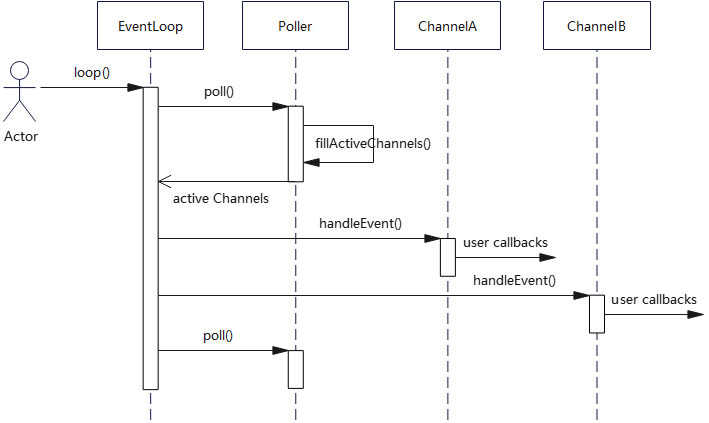muduo库-事件通道Channel
之前说过,Poller的存在是为了监听事件,那么具体监听什么事件呢?
这就需要用到Channel类,它是muduo库负责注册读写事件的类,并保存了fd读写事件发生时调用的回调函数,如果poll/epoll有读写事件发生则将这些事件添加到对应的通道中。一个通道对应唯一EventLoop,一个EventLoop可以有多个通道 。
一个通道对应唯一EventLoop,一个EventLoop可以有多个通道。
一个Channel对象绑定了一个fd(文件描述符),可以用来监听发生在fd上的事件,事件包括空事件(不监听)、可读事件、写完成事件 。当fd上被监听事件就绪时,对应Channel对象就会被Poller放入激活队列(activeChannels_) ,进而在loop循环中调用封装在Channel的相应回调来处理事件。
attention
Channel类不负责fd的生存期,fd的生存期是由socket决定的,断开连接关闭描述符。
Channel可以通过EventLoop,向Poller更新自己关心的(监听)事件(通过map
Poller::channels_存储)。具体来说,对于PollPoller对象,会同步更新(poll)传给内核的poll事件数组pollfds_;对于EPollPoller对象,会同步更新(epoll)传递给内核的epoll事件数组events_;
可以这样理解,poll/epoll监听的是fd(上指定的事件pollfd.events),Poller监听的是Channel对象(上指定的事件events_),当监听到事件就绪时,将对应通道加入激活通道队列,在EventLoop的loop循环中依次调用Channel中注册的事件回调。
EventLoop、Poller、Channel这3个类构成了Reactor模式的核心,其时序关系如下图:
Channel 类
每个Channel对象从始至终只负责一个文件描述符(fd)的IO事件分发,但不拥有fd,也不会在析构时关闭fd 。而是由诸如TcpConnection、Acceptor、EventLoop等,这样需要监听指定文件描述符上事件的类,将fd通过构造函数传递给Channel。
Channel会把不同的IO事件分发为不同的回调,如ReadCallback、WriteCallback,回调对象类型用std::function<>表示,用来定义某个可调用类型。
事件回调类型:
1 2 3 4 #include <functional> typedef std::function<void ()> EventCallback;typedef std::function<void (Timestamp)> ReadEventCallback;
Channel成员函数主要包括:
设置事件处理的回调函数setCallback(如setReadCallback);
开启fd关心的事件events_,可调用enable(如enableReading),该fd及关心的事件会注册到Poller中进行监听;
关闭fd关心的事件events_,可调用disable*(如disableReading),会更新该fd在Poller中监听的事件;
关闭fd关心的所有事件events_,可调用disableAll,会更新该fd在Poller中监听的事件;
删除对fd的监听,会将其从Poller的ChannelMap中移除;
Poller监听到Channel事件被激活时,将其加入到激活列表,在EventLoop中回调handleEvent。
Channel类内部结构
1 2 3 4 5 6 7 8 9 10 11 12 13 14 15 16 17 18 19 20 21 22 23 24 25 26 27 28 29 30 31 32 33 34 35 36 37 38 39 40 41 42 43 44 45 46 47 48 49 50 51 52 53 54 55 56 57 58 59 60 61 62 63 64 65 66 67 68 69 70 71 72 73 74 75 76 77 78 79 80 81 82 83 84 85 86 87 88 89 90 91 92 93 class Channel : private noncopyablepublic :typedef std::function<void ()> EventCallback; typedef std::function<void (Timestamp)> ReadEventCallback; Channel (EventLoop* loop, int fd__);Channel ()void handleEvent (Timestamp recevieTime) void setReadCallback (ReadEventCallback cb) { readCallback_ = std::move (cb); }void setWriteCallback (EventCallback cb) { writeCallback_ = std::move (cb); }void setCloseCallback (EventCallback cb) { closeCallback_ = std::move (cb); }void setErrorCallback (EventCallback cb) { errorCallback_ = std::move (cb); }void tie (const std::shared_ptr<void >&) int fd () const return fd_; }int events () const return events_; }void set_revents (int revt) bool isNoneEvent () const return events_ == kNoneEvent; }void enableReading () update (); }void disableReading () update (); }void enableWriting () update (); }void disableWriting () update (); }void disableAll () update (); }bool isWriting () const return events_ & kWriteEvent; }bool isReading () const return events_ & kReadEvent; }int index () return index_; }void set_index (int idx) string reventsToString () const ;string eventsToString () const ;void doNotLogHup () false ; }EventLoop* ownerLoop () { return loop_; }void remove () private :static string eventsToString (int fd, int ev) void update () void handleEventWithGuard (Timestamp receiveTime) static const int kNoneEvent;static const int kReadEvent;static const int kWriteEvent;const int fd_; int events_; int revents_; int index_;bool logHup_;void > tie_;bool tied_; bool eventHandling_; bool addedToLoop_;
handleEvent 处理事件
处理激活的Channel事件,由Poller更新激活的Channel列表,EventLoop::loop()根据激活Channel列表,逐个执行Channel中已注册好的相应回调。实际事件处理工作,由handleEventWithGuard完成。
1 2 3 4 5 6 7 8 9 10 11 12 13 14 15 16 17 18 19 20 21 22 23 24 25 26 27 28 29 30 31 void Channel::handleEvent (Timestamp recevieTime) void > guard;if (tied_)lock ();if (guard)handleEventWithGuard (recevieTime);else handleEventWithGuard (recevieTime);
handleEventWithGuard
识别事件并回调
根据不同的激活原因,调用不的回调函数。这些回调函数,是在持有Channel对象,需要进行事件监听的class中进行设置,比如TcpConnection,EventLoop,Acceptor,TimerQueue等。而有些回调函数,经过层层传递,会呈现可网络库的调用者,比如TcpConnection会将处理一个socket
fd的读事件回调(新建连接请求),传递给TcpServer::newConnection,这样用户就能通过TcpServer::setConnectionCallback设置其回调。
1 2 3 4 5 6 7 8 9 10 11 12 13 14 15 16 17 18 19 20 21 22 23 24 25 26 27 28 29 30 31 32 33 34 void Channel::handleEventWithGuard (Timestamp receiveTime) true ; reventsToString (); if ((revents_ & POLLHUP) && !(revents_ & POLLIN))if (logHup_)"fd = " << fd_ << " Channel::handle_event() POLLHUP" ;if (closeCallback_) closeCallback_ ();if (revents_ & POLLNVAL) "fd = " << fd_ << " Channel::handle_event() POLLNVAL" ;if (revents_ & (POLLERR | POLLNVAL)) if (errorCallback_) errorCallback_ ();if (revents_ & (POLLIN | POLLPRI | POLLRDHUP)) if (readCallback_) readCallback_ (receiveTime);if (revents_ & POLLOUT)if (writeCallback_) writeCallback_ ();false ;
update 更新通道
通过EventLoop对象,传递给Poller对象,然后更新其监听的通道列表中对应通道。支持ADD/MOD操作。
1 2 3 4 5 6 7 8 9 10 11 12 13 14 15 16 17 18 19 20 21 22 23 24 25 26 27 28 29 30 31 32 33 34 35 36 37 38 39 40 41 42 43 44 45 46 47 48 49 50 51 52 53 54 void Channel::update () true ;updateChannel (this );void EventLoop::updateChannel (Channel *channel) assert (channel->ownerLoop () == this );assertInLoopThread ();updateChannel (channel);void PollPoller::updateChannel (Channel *channel) assertInLoopThread ();"fd = " << channel->fd () << " events = " << channel->events ();if (channel->index () < 0 )assert (channels_.find (channel->fd ()) == channels_.end ());struct pollfd pfd;fd ();static_cast <short >(channel->events ());0 ;push_back (pfd);int idx = static_cast <int >(pollfds_.size ()) - 1 ;set_index (idx);else assert (channels_.find (channel->fd ()) != channels_.end ());assert (channels_[channel->fd ()] == channel);int idx = channel->index ();assert (0 <= idx && idx < static_cast <int >(pollfds_.size ()));struct pollfd & pfd = pollfds_[idx];assert (pfd.fd == channel->fd () || pfd.fd == -channel->fd () - 1 );fd ();static_cast <short >(channel->events ());0 ;if (channel->isNoneEvent ())fd () - 1 ;
remove 移除通道
与update类似,也是通过EventLoop传递给Poller对象,将当前通道从Poller的事件列表中删除。支持DEL操作。
1 2 3 4 5 6 7 8 9 10 11 12 13 14 15 16 17 18 19 20 21 22 23 24 25 26 27 28 29 30 31 32 33 34 35 36 37 38 39 40 41 42 43 44 45 46 47 48 49 50 51 void Channel::update () true ;updateChannel (this );void EventLoop::updateChannel (Channel *channel) assert (channel->ownerLoop () == this );assertInLoopThread ();updateChannel (channel);void PollPoller::removeChannel (Channel *channel) assertInLoopThread ();"fd = " << channel->fd ();assert (channels_.find (channel->fd ()) != channels_.end ());assert (channels_[channel->fd ()] == channel);assert (channel->isNoneEvent ());int idx = channel->index ();assert (0 <= idx && idx < static_cast <int >(pollfds_.size ()));const struct pollfd & pfd = pollfds_[idx]; (void )pfd;assert (pfd.fd == -channel->fd () - 1 && pfd.events == channel->events ());size_t n = channels_.erase (channel->fd ());assert (n == 1 ); (void )n;if (implicit_cast <size_t >(idx) == pollfds_.size () - 1 )pop_back ();else int channelAtEnd = pollfds_.back ().fd;iter_swap (pollfds_.begin () + idx, pollfds_.end () - 1 );if (channelAtEnd < 0 )1 ;set_index (idx);pop_back ();
参考
muduo笔记
网络库(三)事件通道Channel
